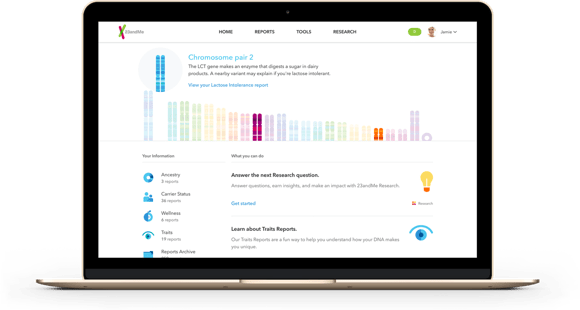Step forward and contribute
to
depression and bipolar research
Thank you to all community members who enrolled in the depression
and bipolar study.
Enrollment for this study is now closed.
You can participate in this study if:
- You are 18-50 years old and live in the United States.
- You have access to a desktop or laptop computer; smartphones and tablets will not work with this study.
- You have been diagnosed with major depressive disorder or bipolar disorder.
- You have been prescribed medication to treat major depressive disorder or bipolar disorder.
- You are willing to provide a saliva sample for DNA testing.
- You are willing to complete online study sessions over the course of nine months. Each study session takes between 10-30 minutes and may include surveys and a series of cognitive tests online.
If you have been diagnosed with major depression, or bipolar disorder I, or bipolar disorder II by a medical professional and you meet the other criteria listed above, you may be eligible to participate in this study.

Why your help is so important.
The National Institutes of Health estimates that more than 16 million Americans are affected by depression each year, and nearly 6 million Americans suffer from bipolar.1,2 However, current treatment options do not always work for people living with these conditions. To develop more targeted treatments, scientists need to better understand the genetics of depression and bipolar.
That is where you can help: each person with depression and bipolar has unique genetic information and is shaped by their own unique experiences. Our study on these conditions is the first to combine data from genetics, cognitive tests and online surveys. This data will be analyzed to look for clues as to how genetics and environmental factors combine to impact brain function.
When we combine these results from thousands of participants, we hope to gain new insights into how the brain works. By choosing to participate in this study, you are helping us take a step toward finding answers and possibly better treatment outcomes.

In August 2016 a landmark study was published by 23andMe, Massachusetts General Hospital and Pfizer, detailing the scientific connection between genetics and depression. In that study, we identified 15 genetic regions that were linked to depression. However, even with recent scientific advancements, more research is needed to help accelerate our understanding of these conditions and drive medical discoveries forward.

Large DNA study using 23andMe data finds 15 sites linked to depression.
Read the story.We are building on promising research.
In August 2016 a landmark study was published by 23andMe, Massachusetts General Hospital and Pfizer, detailing the scientific connection between genetics and depression. In that study, we identified 15 genetic regions that were linked to depression. However, even with recent scientific advancements, more research is needed to help accelerate our understanding of these conditions and drive medical discoveries forward.

Large DNA study using 23andMe data finds 15 sites linked to depression.
Read the story.What you get by participating.
If you are new to 23andMe, when you participate in this study, not only will you contribute to this first-of-its-kind research and help us take a step toward learning more about the genetics of depression and bipolar, but you will also experience 23andMe for yourself and receive over 70 personalized genetic reports online about your health, ancestry and traits.

How it works.
It is just saliva - and a little computer time.
Provide a saliva sample
We will mail a DNA saliva collection kit to you with instructions. No blood tests or trips to a testing site are required.

Monthly Online Study Sessions
Every month over the next nine months, we will email you monthly online study sessions to complete at home on your computer. Each month your experience will be a little different. Your total time invested will be approximately two hours over nine months, with each session lasting between 10 to 30 minutes.
Surveys
Topics could include your symptoms, recent mood, lifestyle, behaviors, medications and experiences.
Cognitive tests
These are short games you play on your computer to measure your mental processes such as attention, decision making and reaction time.
You control your data. Here is how we protect and secure your information.
A little bit about us.
23andMe was founded in 2006 to help people access, understand and benefit from the human genome. A key part of our mission is to do research to better understand how DNA affects people's health and ancestry.
We have more than three million genotyped customers around the world and over 80% of them have consented to participate in our research. We believe that the power to affect change increases with the number of people participating in research because researchers will have greater amounts of data to mine and analyze.
We use the Internet to bring people together to share their personal health and genetic data with researchers - regardless of how close they live to a clinic or research facility.
Meet our collaborators
23andMe is launching this study in collaboration with the Milken Institute and Lundbeck to try and uncover the underlying genetics involved in depression and bipolar.

The Milken Institute is a nonprofit, nonpartisan think tank focused on improving global prosperity by advancing collaborative solutions that widen access to capital, create jobs and improve health.

Lundbeck is a global pharmaceutical company highly committed to improving the quality of life of people living with psychiatric and neurological disorders.
Our scientific advisors and consultant
Our scientific advisors and consultant
We've selected advisors with a range of expertise on depression and bipolar. They are not part of 23andMe, Lundbeck, Milken Institute or any other study collaborator. They are experts in the field and their experience can range from seeing patients to being a part of cutting edge research. They assist us with survey development and data analysis, and help guide our research so our goals are unbiased – not self-serving. The advisors are individual consultants to the study and are not representing the organizations that they are otherwise associated with.

Ahmad Hariri, PhD
Professor of Psychology & Neuroscience at Duke University, and Director of the Laboratory of NeuroGenetics.

Jordan Smoller, MD
Professor of Psychiatry at Harvard Medical School and Professor in the Department of Epidemiology at the Harvard T.H. Chan School of Public Health in Boston. He is also Associate Chief for Research for Massachusetts General Hospital (MGH) Department of Psychiatry and Director of Psychiatric Genetics.

Steve Hamilton, MD, PhD
Psychiatrist in the Permanente Medical Group, Clinical Faculty, previously Associate Professor of Psychiatry and Carol Cochran Schaffner Endowed Chair in Mental Health at the University of California, San Francisco.

Joshua Buckholtz, PhD
Associate Professor of Psychology at Harvard University and serves on the faculty of the Department of Psychiatry at Massachusetts General Hospital.

John Harrison, PhD
Visiting Professor at the Institute of Psychiatry, Psychology and Neuroscience at King’s College London and Associate Professor at the Alzheimer’s Centre, VUmc, Amsterdam. He is also Principal Consultant at Metis Cognition Ltd. Dr. Harrison is also co-chair of the THINC-it Task Force, which is focused on cognition dysfunction in depression.

Patrick Sullivan, MD
Yeargan Distinguished Professor of Psychiatry and Director of the Center for Psychiatric Genomics at the University of North Carolina at Chapel Hill. He is a Professor in the Department of Medical Epidemiology and Biostatistics at Karolinska Institutet in Stockholm, Sweden, where he directs the Psychiatric Genomics Institute.

Laura Germine, PhD
(Consultant) Director of Brain and Cognitive Health Technology at McLean Hospital and Harvard Medical School. She is also Founder and Director of TestMyBrain.org and the Many Brains Project.
FAQs and Resources
Still have questions about our depression and bipolar study? Here are a few of the things people frequently ask about.
Don't see your question here? Get in touch with us at depression-bipolar-study@23andme.com.
Still have questions about our depression and bipolar study? Here are a few of the things people frequently ask about.
Don't see your question here? Get in touch with us at depression-bipolar-study@23andme.com.
Participation
This is a research study focused on better understanding the underlying genetic and environmental factors that contribute to depression and bipolar. The ultimate goal of this research is to improve the lives of people living with these conditions through better treatment options.
Currently, the causes of these conditions are unknown, but previous research suggests that there is a strong genetic component. The 23andMe online platform enables a large group of individuals to come together to provide valuable data to researchers. This research data includes genetic information (using DNA from saliva), cognitive tests (using a variety of computer activities) and information about each participant's unique experiences (using responses from online surveys). Conducting research using this data may help improve diagnosis and find better treatments.
Our goal is to enroll 15,000 participants with depression and 10,000 with bipolar.
You can participate in this study if:
- You are 18-50 years old and live in the United States.
- You have access to a desktop or laptop computer; smartphones and tablets will not work with this study.
- You have been diagnosed with major depressive disorder* (clinical depression) or bipolar disorder**.
- You have been prescribed medication to treat major depressive disorder or bipolar disorder.
- You are willing to provide a saliva sample for DNA testing.
- You are willing to complete online study sessions over the course of nine months. Study sessions each take between 10-30 minutes and may include surveys and a series of cognitive tests online.
If you have been diagnosed with major depression, or bipolar disorder I, or bipolar disorder II by a medical professional and you meet the other criteria listed above, you may be eligible to participate in this study.
This is a research study focused on better understanding the underlying genetic and environmental factors that contribute to depression and bipolar. As part of this study, participants take a number of cognitive tests to measure attention, decision making and reaction time.
The best part about these tests is there are no right or wrong answers, nor is there any judgement. Everyone's test results vary greatly. Responses can depend on how much sleep you've had, what medication you're taking, or even your age. We are limiting enrollment in this study to individuals between 18 and 50 years of age to minimize age-related effects on the study data.
Joining this study will not affect your diagnosis or treatment options today. Participation allows you to contribute to a first-of-its-kind effort to understand how these conditions affect the brain in thousands of people living with depression and bipolar.
At this time, the 23andMe® Personal Genetic Service does not include health reports on depression and bipolar.
It means that you will agree to contribute your information for research purposes. There are many aspects to being a research participant. We have summarized the most important ones below. If you have more questions, you can contact us at depression-bipolar-study@23andme.com.
What will I be asked to do?
You will be asked to:
- Enroll and consent to our depression and bipolar study through this website.
- Respond to a short questionnaire to determine your eligibility to participate. This step is very important to ensure the integrity of the study.
- Provide a DNA sample (from your saliva) for analysis and send it back to 23andMe. It is very important to send back your saliva sample within 30 days of receiving your saliva collection kit to secure your spot in the study. Since our goal is to accelerate critical health research, we cannot guarantee your enrollment in the study if you do not send your kit back within 30 days of receipt.
- Allow 23andMe to keep this saliva sample stored in our laboratory by consenting to biobanking.
-
Complete online monthly study sessions which
include online surveys and cognitive tests over the course of
nine months. After you complete your first session, we will send
you notifications each month when your next monthly study session
is ready. You will have 30 days to complete each session. We
will send reminders if you have not finished all the available
steps.
- Immediately after enrolling, your first study session will be available for you to complete. It will include a survey with questions on your symptoms, recent mood, lifestyle, childhood experiences and treatments, as well as your first cognitive test. This session should take you about 15 minutes to complete.
- One month after finishing the first study session, Study Session 2 will be available for you to complete and will include a short survey about your recent mood and medications, as well as a new cognitive test. This session should take you about 10 minutes to complete.
- Study Session 3 will include the same short survey about your recent mood and medications as Session 2, and a new cognitive test. This session should take you about 10 minutes to complete.
- Study Session 4 will include the same short survey about your recent mood and medications as Study Sessions 2 and 3, and a new cognitive test. This session should take you about 10 minutes to complete.
- Study Session 5 will include the same short survey about your recent mood and medications as Study Sessions 2-4, and a new cognitive test. This session should take you about eight minutes to complete.
- Study Session 6 will include two surveys. One is about any risky or impulsive behaviors and another about any traumatic life experiences. This session should take you about 10 minutes to complete.
- Study Session 7 will include the same short survey about your recent mood and medications as Study Sessions 2-5, and the same cognitive test as Study Session 2. This session should take you about 10 minutes to complete.
- Study Session 8 will include two surveys. One about your behavior and another about your family and social support. This session should take about 10 minutes to complete.
- Session 9 (your last session) will include a short survey about your recent mood and medications, and repeat three of the cognitive tests you had taken previously. This session should take about 25 minutes to complete.
What if I no longer want to participate in this research?
You can withdraw from research at any time by changing your consent status in your account settings. Email us at depression-bipolar-study@23andme.com and we can help you.
How will 23andMe use my data?
When you participate in this study, 23andMe will use your information in two key ways: 1) in order to provide you services as a customer of 23andMe and 2) for research purposes.
We use your data to operate, provide, analyze and improve our services. These activities may include, among other things, using your information to:
- Open your account, enable purchases and process payments, communicate with you, and implement your requests (e.g., referrals).
- Process and deliver your genetic testing results.
- Offer new products or services to you, including through emails, promotions or contests.
In order to enroll in our depression and bipolar study, you will need to agree to several consent documents which enable us to use and share your data in the following ways:
Data summaries:
When you agree to the general 23andMe Research Consent Document, you are giving consent for 23andMe to include your genetic and self-reported information in data summaries we share with qualified third party researchers.
23andMe may share your de-identified data (so you cannot be easily identified), which is bundled with data from other research participants, with qualified research partners for this study and potentially for other studies in the future. This research could cover many different topics studied by 23andMe and our research collaborators.
Non-summarized, individual-level data:
When you agree to the depression and bipolar study consent document, you will consent to share individual, non-aggregated data with our qualified third party researchers. This means we can share your individual genetic and self-reported data with third party researchers without bundling it. The information we share about you with our research collaborators will be stripped of identifying components (name, email, address, user ID and password). These researchers will only be able to use your data to study depression, bipolar disorder and related conditions.
We encourage you to read these consent documents carefully. For your records, you can print each of the consent documents or review them at any time by going to your account settings. If you have any questions, don't hesitate to reach out to us at depression-bipolar-study@23andme.com.
What are the emotional risks of being a research participant?
The study surveys cover a wide range of topics, including questions about your lifestyle, recent mood, risky behavior, symptoms, medications and traumatic childhood experiences. Some topics may be highly personal and difficult to discuss, and answering some of the survey questions may cause emotional discomfort. Please note that participation in this research study is completely voluntary. As a research participant, you may stop answering surveys at any point or decline to answer any questions you do not wish to answer.
When scientific papers are published on sensitive subjects like depression and bipolar, we cannot always anticipate the findings or how they will be interpreted by a broader audience. There is always a risk that scientific findings can be complex and misunderstood. It's possible these findings may reinforce existing negative stereotypes or perceptions about depression or bipolar, or give rise to new ones. We are informing you of this possibility because when studies on this data are published, they might change the way you or groups you belong to are seen by the general public.
If you are not already a 23andMe customer, you may learn information about yourself that you do not anticipate (e.g., that you are not related to a family member in the way you thought, or surprising facts related to your ancestry). Please refer to our Terms of Service for more details about the risks of being genotyped.
What are the privacy risks of being a research participant?
Being a research participant means that 23andMe will store your genetic information, cognitive test results and survey answers (this includes responses to questions or surveys you might feel are sensitive in nature), and securely transfer them to qualified research partners. If a security breach occurs, your data could be leaked. Please refer to How do you protect the confidentiality of my data? for more information about this risk.
What are the advantages of being a research participant?
This is a new opportunity to participate in depression and bipolar genetics research.
As a research participant, you:
- Could play a role in helping researchers understand the relationship between depression and bipolar, and genetics.
- Will be kept informed of the discovery process as research advances.
- Will have the option to learn more about your genetic health and ancestry.
What do I need to do to participate?
- Start the enrollment process by answering questions to determine your eligibility and providing consent through this website.
- If you haven't already, provide a saliva sample and send it back in the pre-paid postage box. If you don't believe you will be able to complete this step within 30 days, we recommend that you do not participate in this study.
- Complete monthly online study sessions which include surveys and cognitive tests over the course of nine months. After you complete your first session, we will send you notifications each month when your next monthly study session is ready. You will have 30 days to complete each session. We will send reminders if you haven't finished all the available steps.
- Immediately after enrolling, your first study session will be available for you to complete. It will include a survey with questions on your symptoms, recent mood, lifestyle, childhood experiences, and treatments as well as your first cognitive test. This session should take you about 15 minutes to complete.
- One month after finishing the first study session, Study Session 2 will be available for you to complete and will include a short survey about your recent mood and medications as well as a new cognitive test. This session should take you about 10 minutes to complete.
- Study Session 3 will include the same short survey about your recent mood and medications as Session 2 and a new cognitive test. This session should take you about 10 minutes to complete.
- Study Session 4 will include the same short survey about your recent mood and medications as Study Sessions 2 and 3 and a new cognitive test. This session should take you about 10 minutes to complete.
- Study Session 5 will include the same short survey about your recent mood and medications as Study Sessions 2-4 and a new cognitive test. This session should take you about eight minutes to complete.
- Study Session 6 will include two surveys. One is about any risky or impulsive behaviors and another about any traumatic life experiences. This session should take you about 10 minutes to complete.
- Study Session 7 will include the same short survey about your recent mood and medications as Sessions 2-5 and the same cognitive test as Study Session 2. This session should take you about 10 minutes to complete.
- Study Session 8 will include two surveys. One about your behavior and another about your family and social support. This session should take about 10 minutes to complete.
- Session 9 - your last session - will include a short survey about your recent mood and medications and repeat three of the cognitive tests you had taken previously. This session should take about 25 minutes to complete.
Do the 23andMe Terms of Service apply to participants in the depression and bipolar study?
If you agree to participate in the depression and bipolar study, your participation includes the use of a 23andMe DNA kit and optional access to the 23andMe Service at no cost. As part of joining this study you will be required to agree to the 23andMe Terms of Service document.
We want to make sure you understand that while participating in the study activities described below, the following sections of the Terms of Service will not apply to the extent they prevent you from pursuing a claim if you suffer a research-related injury:
- Section 14 ("Indemnity")
- Section 23 ("Disclaimer of Warranties"), Subsections (1), (3), (4), and (5)
- Section 24 ("Limitation of Liability")
- Section 28(d) ("Term for cause of action")
Study activities include:
- Providing a saliva sample for genetic analysis using a 23andMe DNA kit.
- Completing the depression and bipolar study surveys.
- Completing the depression and bipolar study cognitive assessments.
Please note, however, that if you choose to use any of 23andMe's products, software, services, and website, outside of your participation in these study activities, you will be, just like all users of 23andMe's products, software, services, and website, subject to the 23andMe Terms of Service.
Surveys will include questions about your mental health history, any relevant diagnoses, treatments, medications and family history.
Some of the survey questions are easy. Others might be more difficult to answer such as questions about your symptoms, recent mood, lifestyle, risky behavior, medications and traumatic childhood experiences. Some survey topics may be highly personal and difficult to discuss, and answering some of the questions may cause emotional discomfort. We ask these questions to capture the most complete picture of your condition. The more information we have about your experience with depression or bipolar, the more helpful your answers are to gaining new insights and making real discoveries.
Please note that participation in this research study is completely voluntary, and you may stop answering surveys at any point, for any reason. You can decline to answer any questions you do not wish to answer.
The depression and bipolar study includes surveys and cognitive tests over a period of nine months. As more people join the study and our research scientists start to look at the data, there may be an opportunity to participate in additional studies to enhance the research.
As additional opportunities come up, we will communicate these in study newsletters, emails, and/or in your 23andMe.com homepage.
If you misplace your kit, don't worry. Email us at depression-bipolar-study@23andme.com and we will mail you a new one at no cost.
Once you're enrolled, we'll send you reminders to return your kit.
Please know that to secure your spot in the study, you will need to send back your saliva sample to our lab within 30 days of receiving your kit. To make sure we conduct research as quickly as possible, we cannot guarantee your enrollment in the study and may close your 23andMe account if you do not send your kit back within this timeframe. If you have had your kit for 30 days or you are not sure how long you have had your kit for and would still like to participate in the study, feel free to email us at the address listed above to see if we can extend this timeframe.
We are here to answer your questions. Email us at depression-bipolar-study@23andme.com and we will do our best to get back to you within two weeks.
Existing and New Customers
Existing customers are customers who purchased a 23andMe kit prior to joining the study. We welcome any customer who wants to participate in this study, as long as they meet the eligibility criteria listed above.
When existing customers join our depression and bipolar study and agree to the study terms, they will receive a $20 Amazon gift card as compensation for already having purchased a kit and having been genotyped.
However, please know that the product experience will not change as a result of an existing customer's participation in a study. If an existing customer purchased the Ancestry Service, he or she will not gain access to the Health + Ancestry Service without purchasing an upgrade. No customers receive health reports on depression or bipolar disorder.
New customers have not yet purchased a 23andMe kit prior to enrolling in a study. If they enroll in this study and meet the eligibility criteria, new customers will receive the 23andMe® Health + Ancestry Service, including a DNA test kit, at no cost.
Research
We believe that this study will enhance research into mental health by:
- Bringing together a large group of people to better understand how genes may influence depression and bipolar.
- Combining insights from cognitive tests with genetic and survey data to better understand how the brain functions.
- Expanding the geographic reach of the research study by enabling participation from home.
- Removing some of the time and cost barriers that can slow progress in other types of studies.
Cognitive tests are short computer activities that measure different aspects of the brain such as attention, processing speed and risk-taking tolerance. There are many cognitive tests used widely in the field of psychiatric research. We worked closely with our scientific advisors to select tests that would have the greatest impact on our study, as well as those that are most engaging for participants.
Once you complete a cognitive test you will receive a summary of your results. The best part about these tests is there are no right or wrong answers, nor is there any judgment. Everyone's test results vary greatly. Your responses can depend on how much sleep you have had, what medication you are taking or even your age.
23andMe® Personal Genetic Service
23andMe®'s Personal Genetic Service offers over 70 personalized genetic reports on your health, traits and ancestry based on your DNA. You can learn more about this service at 23andMe.com.
If you are new to 23andMe, as part of your participation in this research study, you will receive complimentary access to 23andMe®'s Personal Genetic Service.
If you are already a customer of 23andMe, you will not be eligible to receive an additional complimentary 23andMe®'s Personal Genetic Service kit.
You will continue to have access to your 23andMe account and will receive report updates as long as the genetic information referenced in those updates is generated from your original DNA sample. If a future feature or report relies on DNA results not included in your initial analysis, you may need to purchase a new kit and provide an additional saliva sample to access that feature or report. Any future upgrades beyond the current technology are not included as a benefit to participation.
Your 23andMe account will not be eligible to post on the community forums at this time.
Participants who purchased a 23andMe kit and created a 23andMe account prior to joining
the depression and bipolar study will lose access to the community forums. This means
that once a participant enrolls and is accepted into the study, they will no longer be
able to post on the community forums.
Security and Data Sharing
To increase the chance that meaningful scientific discoveries about your condition are made, 23andMe may share your de-identified, individual-level data with qualified research partners for this study and potentially for other studies in the future. 23andMe only provides de-identified data, which means that you cannot be easily identified by others (researchers, scientists, etc.).
The shared data will be stripped of all identifying components (name, email, address, user ID and password). If 23andMe shares your genetic or self-reported data with a qualified research partner, this action cannot be undone and your data will not be returned to 23andMe. Please refer to our Privacy Statement to learn more about our practices.
23andMe may share your de-identified, individual-level data with qualified research partners. This means you cannot be easily identified by others whom we partner with in the future (researchers, scientists, etc.). All 23andMe research is performed in a secure computing environment with access restricted to research scientists and system administrators. All 23andMe servers are protected by technical, physical, and administrative procedures. Our servers are monitored for unauthorized activity. Your genetic data and sensitive account information such as passwords are encrypted, as are all data transfers between our servers and your computer(s).
All data in the research computing environment are disconnected from your contact or identifying information and are coded with a unique research ID. 23andMe research scientists who have access to your sensitive data (i.e. DNA results, survey responses) do not have access to your account or contact information. Conversely, 23andMe project managers who have access to your contact information do not have access to your sensitive individual-level data. Thus, it would be extremely difficult for 23andMe employees or any external party to link your individually identifying information to your DNA results and survey response data.
Unfortunately, there are always unknown threats in information security. Therefore, we cannot fully guarantee the security of your data. However, we regularly update our security systems and protocols to protect your data from new threats as they become known.
23andMe will also have agreements with all research partners regarding the security and storage of de-identified, individual-level data that is shared outside 23andMe. Although 23andMe cannot provide a 100% guarantee that your data will be safe, 23andMe policies and procedures minimize the chance that a breach could take place.
If a commercial product is developed as a result of findings from this research, rights to the commercial product will belong to 23andMe and/or Lundbeck and their collaborators (persons or companies partnering with Lundbeck). You and your family will not receive any financial benefits or compensation from or have any rights in any developments, inventions or other discoveries that might come out of this research.
Genotyping Resources
- The 23andMe® Personal Genetic Service Read More
- 23andMe and your personal information Learn More
- How 23andMe safeguards your information Learn More
- 23andMe Research Learn More
- Genetics 101 Videos Watch Now
- 23andMe Terms of Service Read Now
- What unexpected things might I learn from 23andMe? Read Now
- Anxiety and Depression Association of America. Facts & Statistics. http://www.adaa.org/about-adaa/press-room/facts-statistics. Accessed March 30, 2017.
Changing your location to a region outside the EU may impact how your information is processed. Keep in mind EU data protection laws may no longer apply.
Select your location
Our product is available in English only, and due to the applicable regulations it may only be ordered by customers with shipping addresses in the following countries. If your country is not listed, please visit the International site. (or please visit 23andMe's International site.)